- Home
- Linda Byler
Hester on the Run Page 5
Hester on the Run Read online
Page 5
Ruth was so good with Hester, entertaining her with stories, twining string around her fingers, and playing “Hide the Thimble,” so that Kate’s recovery was a time of contentment and bliss.
During the second week, when she got dressed and sat on her rocking chair, resuming light household duties, she was bothered by a niggling doubt. At first she could push it away successfully, but later, as the days marched on, she confessed to herself, it was beginning to be a worry.
Hans’s lack of attention to his son loomed above her, a real adversary she had to face. He still had not held him. He very seldom looked at him. Usually the baby was sleeping, but still. Was this normal? He hadn’t been this way with Hester. Not at all. He still wasn’t. Why wouldn’t he hold his son?
Before Kate could control them, thick tears leaked from her closed eyelids, and her chest felt as if it would cave in on her stomach. She simply could not rise above a feeling of deep despair.
Hans found her in the rocking chair, crying. Kate would not say what was wrong, but after Ruth was asleep behind the curtain that was placed at one end of the small house, Kate confided in her husband, haltingly at first, but her voice gained strength as she continued.
Hans was guilty, ashamed, and caught red-handed, possessing terrible thoughts about his newborn son. He begged Kate to forgive him. Kate said of course she would and assured him that Noah would grow hair and his looks would change as he became older. She slept dreamlessly that night, so glad the little talk had changed her worst fear about Hans as a harsh and uncaring father.
The following day, Hans held his son for the first time, and Kate’s heart overflowed with joy. He looked down on Noah’s sleeping face, smiled, and said, yes, he would be a strong and husky boy some day. Then he didn’t pick him up or acknowledge his presence for three days. Kate finally decided to let it go. Perhaps this was more usual behavior than she was aware of.
When company began to arrive on Sunday, Hans hardly let go of Hester. She was always ill at ease around strangers, but when the house became full of visitors, she clung to Hans, her black eyes darting from one face to another, as if surveying the room for her own safety.
Many of the visitors commented on Hans’s devotion to Hester and thought it was truly a sign of a caring heart, the way she wasn’t even his own child. Kate smiled and nodded, glad Hans loved the little Indian child. When she confided in Lydia about Hans’s lack of affection for little Noah, Lydia pooh-poohed the silly notion and said lots of fathers didn’t pay much attention to newborn babies.
“They don’t know how to hold them. They feel awkward and think they look stupid. They can’t feed them, so they act as if they don’t even know a baby is in the house. It’s normal.” She held a finger to her lips, held her head sideways. “I’m sort of surprised, though. He’s so good with Hester. I mean, look at him, she never leaves his lap.”
Kate nodded and met Lydia’s eyes, but neither woman said more about it.
Spring came late and slowly that year. Some of the mountain laurel didn’t bloom till June, and many buds froze, so that the pink flowers seemed to be scattered randomly across the bushes, as if they had been forgotten but tacked on at the last minute.
The wind was harsh and the earth cold as Hans and Kate plowed the garden. Hans ran a harrow across the heavy clumps of soil that had rolled away from the plow.
All around them the woodland was coming to life, buds pushing out of branches, small green leaves unfolding under the sun’s caresses, wild daffodils popping out of the moist layer of leaves. The weathered log house stood solidly against the backdrop of trees and hills, a cozy home surrounded by rail fences, the shake roof almost black with age now.
Kate had planted a lovely wild flower on either side of the door, and small pine trees dotted the area around the house. The cows had kept the grass down very well, so it was coming up green and smooth. The slope to the barn contained many dandelions and purple violets.
The new springhouse was more picturesque than ever, now that Hans had built an arbor for the wild grapevines. There were glossy leaves and pink buds where he had trimmed the vines, and Kate was looking forward to making wine in crocks. Her mother had always done that at home in Switzerland.
The barnyard was alive with calves, two new lambs, and a white calf named Ruth. Hester toddled everywhere. It was impossible to keep track of her, she was so quick, darting in and out of buildings or the surrounding forest. Like a mouse, Hans said, a little brown mouse. Kate smiled, then laughed out loud. She really did look like a field mouse.
Kate was so busy she did not notice the nausea when it returned. She just knew she wasn’t hungry, and not once did it occur to her that another child might be on its way until she began losing her breakfast in the woods behind the house. Wiser now, she didn’t undertake a frantic digging for ginger root. Grin and bear it, she told herself.
She didn’t tell Hans, afraid of what he might say. She knew he was busy getting the tobacco in. He had no time for his son, who at almost five months, was grabbing at anything he could catch and stuffing it into his mouth. His hair was still not there, as reluctant to grow as Kate had ever seen anything. Hans always spoke to Noah when he returned from the fields, hot, tired, and overworked, but he seemed reluctant to pick him up even now. Kate paid close attention, her anxiety decreasing whenever Hans would take him up and hold him for a few minutes before a meal was ready. But always Hester was the one he held, whose plate he filled while talking in silly, childish tones. She shrieked with glee, imitating his voice.
When another son arrived, they named him Isaac. He looked very much like Noah, except for a nice amount of brown hair growing mostly along the top of his head.
Lissie was in attendance once more and told Hans this was very nice, naming his son Isaac the way he should. Hans merely said he was glad she approved and left it at that.
He did, however, have to take her home after the maud arrived. He did it with the same speed and lack of caring he’d used when driving Dr. Hess the last time. Lissie careened around on the seat, her full cap sliding around on her head, her hip hurting with each teeth-rattling bump over rocks and ditches. She got down stiffly, faced him, and said if they ever needed her again, she’d bring her own horse and wagon, that if he didn’t have more sense than he had just demonstrated about how to drive a horse, why then, she’d just drive herself.
Hans was deeply ashamed. He hadn’t wanted her to think that way about him. Old bat. Maybe they wouldn’t need her for a while.
With each child, Kate seemed to spread out around the hips until she was quite ample. He felt ashamed of the fact that he didn’t want his wife to look fat like Mamie Troyer.
Well, at least this son had hair. That was a huge relief.
Kate was so busy she had to employ every skill she could muster to get all her work done. Hans’s mother, Rebecca, was pleased they named their second son Isaac, so she made the trek across the hills and ridges quite often to lend a hand wherever Kate needed her, which gave her a boost. She baked sturdy loaves of satisfyingly chewy bread, which they sliced and ate alongside chunks of pork, cooked with some parsley, and salt.
Rebecca said new things were being discovered, different seeds. How would they like to have watermelon? She had planted some, so hopefully, till the end of summer, they would be eating this succulent fruit.
Isaac was a cranky baby, fussing after each feeding. Mamie Troyer treated him, but he remained fussy. Hans said she needed to stop breastfeeding and put him on cow’s milk, but Kate resisted. When Hans stomped out to the barn, slamming the door, she began to cry, but not for long.
She lifted her head and decided Isaac was not fussy because of her nursing. He was cranky because that’s just how he was. So she fed him, changed his diaper, and told herself that if he preferred crying, that was up to him. Noah was not walking at thirteen months, so Kate’s shoulders and arms became strong, enduring many hours of lifting and holding her heavy sons.
Hester was two years ol
d, a happy child and able to entertain herself endlessly outdoors. She ran just for the joy of running, her thin, brown legs propelling her down the slope to the barn at an alarming rate. She could also sit quietly for hours, watching butterflies and bumblebees or listening to the voices of the many kinds of birds singing from the treetops.
That summer she imitated the crow, the cardinal, and the turkeys that gobbled ceaselessly in the evenings behind the house. She began to talk in garbled German. She could not quite master the “r” sound, which always came out as “w.”
Hans was completely enamored of his winsome daughter. Although Kate had her moments of wishing he would pay as much attention to the boys, she held her worries inside, bottled up against his anger and denial. It was easier that way. Submission was necessary as a wife, and she had been taught well by her mother. So she let Hans’s undivided attention rest on Hester, while she tried hard to make up for his lack of interest in Noah and Isaac, devoting her time and attention to them.
Sometimes meals were a disaster, with Isaac screaming and Noah clumsily shoving great amounts of food all over his face. Hans was always quick to smack his hands, which resulted in great howls of protest and Noah’s large mouth spilling food all over the table. Hester sat, her black eyes taking it all in, her mouth giving away no feelings. When Hans turned to smile at her, she did not always smile back. Sometimes she would go around to Noah’s chair after the meal was over and wrap her thin brown arms around him, lay her cheek against his back, and close her eyes briefly.
One night after the children were in bed, Kate saw an opening to approach Hans about his lack of fatherly affection. Hans became contrite, ashamed, yet again.
“Have patience with me, dear Kate. I don’t mean to be partial to Hester. I really don’t. It’s just that I feel so much more for her than I do for my sons. Perhaps I was raised that way. Maybe it’s normal. I do like my sons. I do. Kate, Hester is just different. Do you think it’s because she was abandoned? A poor foundling?”
His face was so earnest, his eyes clear and searching, that Kate’s heart melted within her. She put her arms around her husband and loved him. Of course he was sorry. He was doing the best he could.
Their nest egg grew as Hans carefully placed the dollars from his blacksmithing jobs into the jar. He bought more land and planned to build an addition to their small house before winter.
Kate thanked God for a hardworking husband who provided well for them. She put her worries aside, threw herself into her work as never before, and tried to keep away every unsettling thought that entered her mind.
The women of the community didn’t know how she could manage so well with three little ones. Her house was clean. Her picturesque garden produced many fine vegetables. Her bread was light. She churned butter with great skill so that the wooden dasher pounded the milk into gobs of butter. Her arms grew strong and muscular, and her figure expanded with the many pats of good, rich butter she spread on thick chunks of brown bread. And Kate did like her ham.
CHAPTER 5
AT CHRISTMAS-TIME, THE SNOW LAY DEEP AND heavy, covering the log house with the new addition, burying it up to the windowsills. The snow had come down steadily all night long, and a whole day before that.
Hans stepped out of the house, surveyed the white world, and thought they’d be able to make it to his parents for the Grishtag Essa (Christmas dinner), an annual event, long-awaited and looked forward to.
He’d get the bobsled and clean it well with the straw broom. Yes, hitched double, Dot and Daisy could make it. He went to the barn, fed the livestock and polished the harnesses, swept the bobsled, then went to get Kate’s opinion.
Her eyes were cloudy with doubt, but at his persistence, she placed bricks in the fireplace and began to dress the children. It would be all right to travel the eight-mile distance as long as the wind did not pick up, and it was too early to tell about that. The snow had just stopped.
Hurriedly, they ate cornmeal mush fried in lard, along with bread and butter. Hans rinsed the dishes while Kate pulled on the warm underclothes she would need to stay comfortable, then dressed in the old linen Sunday shortgown and apron she always wore. She did have a freshly washed linen cap, which looked quite neat, so she tied the strings under her chin, jutting it forward so it fit better.
She dressed Noah in warm undergarments, then placed his linen shirt and vest and knee breeches on him.
Little Isaac still wore a dress, which he would continue to wear until he was two, or close to it. He looked angelic with his bangs cut straight across the forehead and locks of light brown hair hanging below his ears in the traditional “Dutch Boy” haircut.
Noah had some very fine blond hair, but you could still mistake him for being bald from a distance. He was husky, large for his age, and a bit pigeon-toed, but he walked and ran as if he’d been doing it for quite some time.
When everyone was bundled into their outerwear, Kate pulled on her cape, wrapping it around herself, tied a heavy scarf around her head and across her mouth, flung the shawl across her shoulders, and secured it with a straight pin. She put her flat hat on last, pulling the front well past her face.
Hans placed the hot bricks wrapped in cloth at their feet. When they were tucked in below layers of bearskins and coverlets, with the horses hitched to the singletree, they were on their way to Doddy (Grandfather) Zug’s house.
Kate was unprepared for the winter wind’s cruel bite. She bent her head to the spray peppering their faces from low-hanging branches and from the horses’ hooves kicking up the powdery snow as well. Chills crept up her spine. She shivered then set her mouth in determination. She would not whine, neither would she complain. It was her wifely duty to abide by the wishes of her husband.
Behind them, Noah was not visible, he was so covered with a heavy layer of robes and skins. Hester, however, had managed to extricate herself from the confines of the heavy covers and sat, her eyes two dark stars of wonderment, peering out over the sides of the bobsled, dodging the spray of snow from the branches, or lifting her face to it, her tongue catching the cold wet particles.
The wind was definitely picking up, and it was only mid-morning. A stab of fear shot through Kate, but she only glanced at Hans, his face resolute beneath the heavy black hat, as he urged the horses forward.
When they arrived at the top of an especially steep incline, Hans pulled back on the reins and said, “Steady, there, Dot. Easy, Daisy.”
The bobsled creaked across a few rocks then dipped at a dangerous angle as they started down over them. Kate pushed her feet against the dashboard to stay seated. She clung desperately to little Isaac and prayed to God that he would see them safely through this dangerous trek to her parents’-in-law home.
She was thankful for Hans’s skill as a blacksmith, as the horses’ haunches backed against the britching, holding the bobsled back, keeping it from careening madly down the rocky incline.
A break in the trees revealed an awesome world of brilliant white, puffs and layers of snow piled on every pine, their jutting, dark green needles accentuating the brilliance of the snow. The sun was obscured by a mass of cold-looking gray and white clouds, and Kate bent her head as a shower of snow blew across her line of vision. There was no doubt in her mind that there would be high winds, and how were they to remain safe? She knew well the roaring of the wind that blew in after a long snowfall, driving great walls of loose, powdery snow ahead of it, creating drifts that could be up to ten feet high.
She swallowed. “Hans,” she said, “the wind is picking up.”
Hans did not answer. He was occupied with the task of getting his family safely down the treacherous mountain road.
A thin, high wail sounded and increased steadily as Noah was thrown from side to side, sliding under the robes and then out of them.
When Kate could turn, she found Hester on her hands and knees, her black shawl flapping in the strong wind, her voice crooning, comforting her brother. “Na, na, na, komm, Noah. Net heila�
�� (Don’t cry).
Noah heard his sister’s voice and calmed down as her mittened hand patted his back. She was not much bigger than he, but she thought of herself as his little mother, taking him under her wing, a two-year-old biddy hen.
Kate’s shoulder slammed into Hans’s as the wagon swung hard to the right, straightened, and then continued its descent. Steam came from the horses’ nostrils in small gray puffs, their exertion showing now in the dark, wet hair around their harnesses.
When they finally found level ground, Kate breathed out as she let the rigid set of her shoulders slump, glad to have navigated that long, steep downhill safely.
The roaring of the wind in the treetops increased now. The snow was only little bits hitting their faces, but as the tree tops lunged and swayed, showers of snow whipped across them, the horses bending their faces along with them, to avoid the stinging.
Hans leaned forward, urging them on, calling loudly. The horses responded by lowering their backs and giving a strong lunge against their heavy collars so that the bobsled whispered through the deep snow.
Whether they hit a rock, or one runner went into a ditch, or one of the horses slipped, Kate could never be sure. She knew only that there was a sharp thud as if the bobsled had slammed against a tree. She heard a resounding crack of wood splitting and felt herself falling sideways, her only thought for Isaac, her sleeping son.
Everything turned into pandemonium after that. Horses whinnied in terror, unable to understand the jutting of the broken singletree that pulled their heavy collars taut to their sweating neck muscles.
Hans cried out as he lost his grip on the leather reins, although he managed to cling to the seat of the bobsled as it turned over on its side. Kate cried out hoarsely once, then remained silent as she lay in the deep fluffy whiteness. Noah screamed and kept on screaming as he was dumped into the snow, his wide, red mouth filled with it. He choked, coughed, and then resumed screaming.

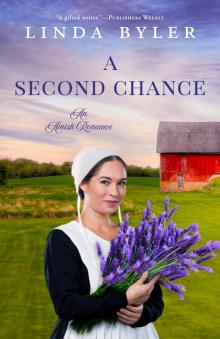 A Second Chance
A Second Chance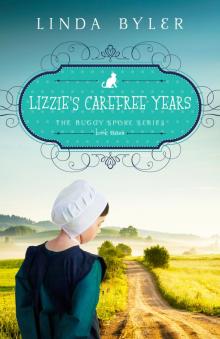 Lizzie's Carefree Years
Lizzie's Carefree Years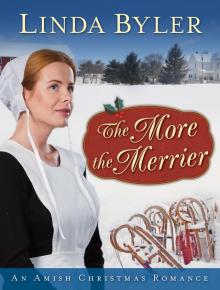 The More the Merrier
The More the Merrier Love in Unlikely Places
Love in Unlikely Places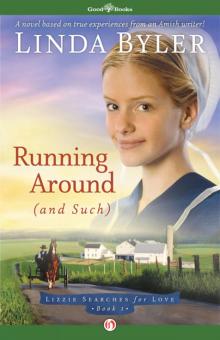 Running Around (and Such)
Running Around (and Such) Wild Horses
Wild Horses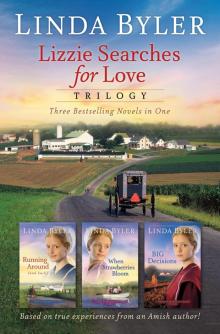 Lizzie Searches for Love Trilogy
Lizzie Searches for Love Trilogy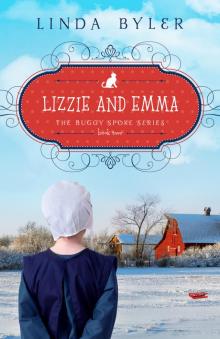 Lizzie and Emma
Lizzie and Emma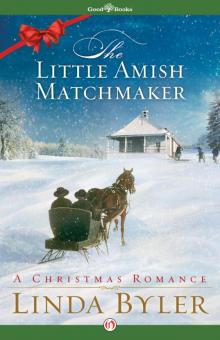 Little Amish Matchmaker
Little Amish Matchmaker The Witnesses
The Witnesses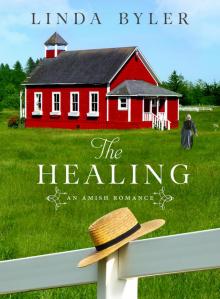 The Healing
The Healing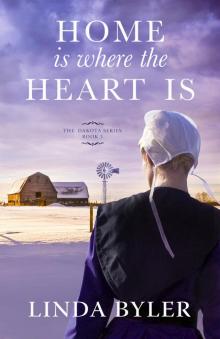 Home Is Where the Heart Is
Home Is Where the Heart Is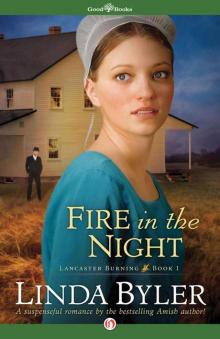 Fire in the Night
Fire in the Night When Strawberries Bloom
When Strawberries Bloom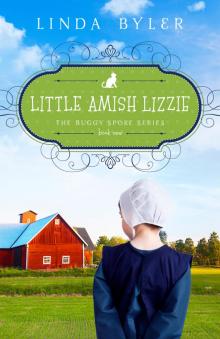 Little Amish Lizzie
Little Amish Lizzie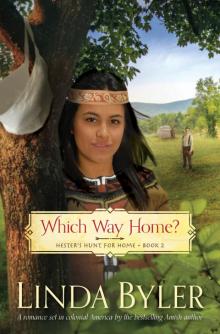 Which Way Home?
Which Way Home?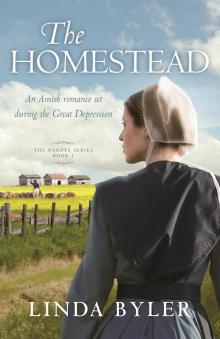 The Homestead
The Homestead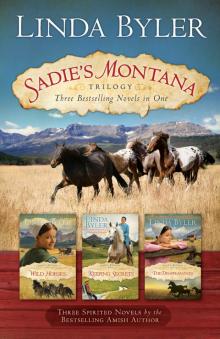 Sadie’s Montana Trilogy
Sadie’s Montana Trilogy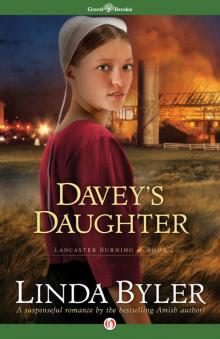 Davey's Daughter
Davey's Daughter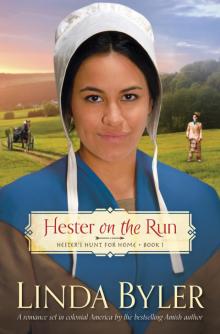 Hester on the Run
Hester on the Run Disappearances
Disappearances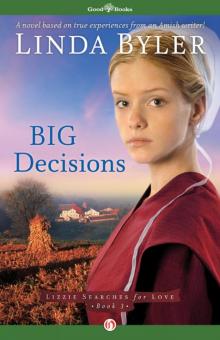 Big Decisions
Big Decisions Becky Meets Her Match
Becky Meets Her Match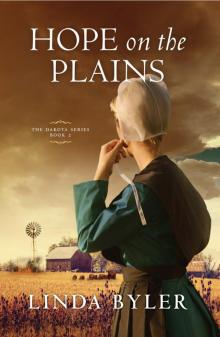 Hope on the Plains
Hope on the Plains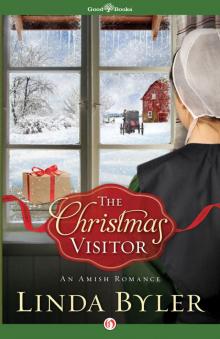 Christmas Visitor
Christmas Visitor